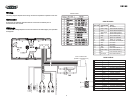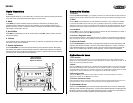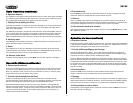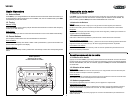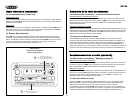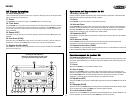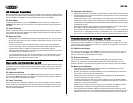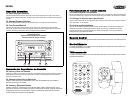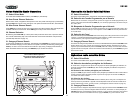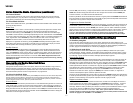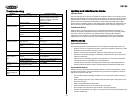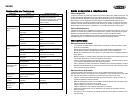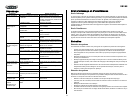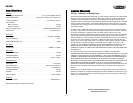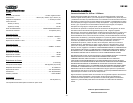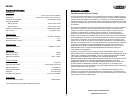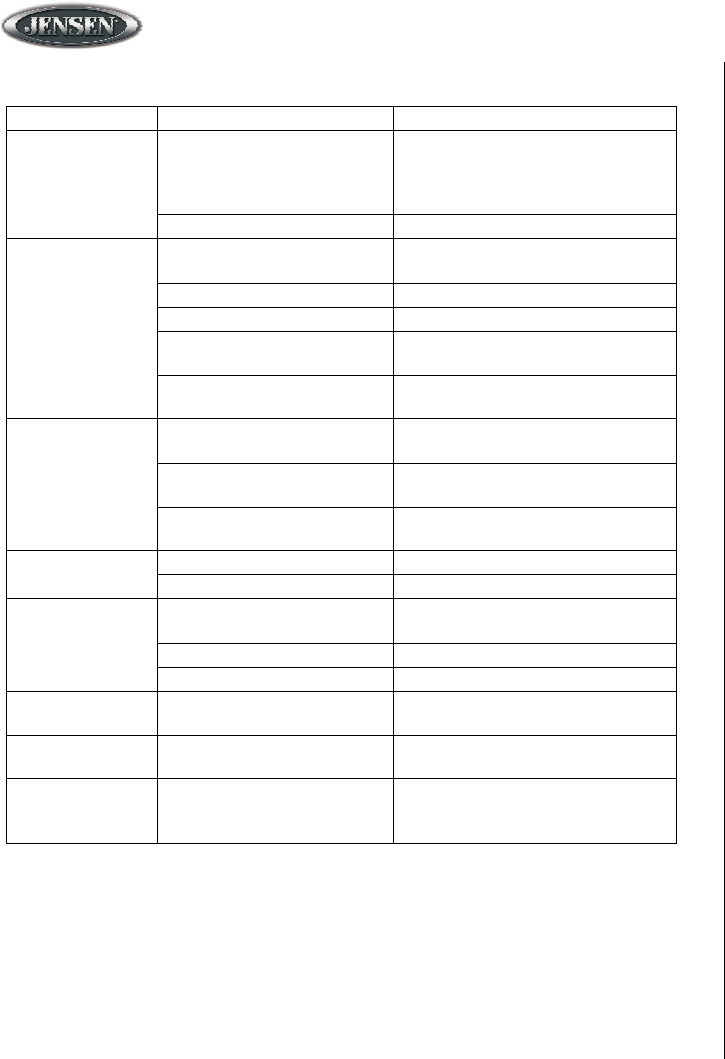
VR185
16
Troubleshooting
Problem Cause Corrective Action
No power. Vehicle ignition switch is not on. If the power supply is connected to the
vehicle accessory circuits but the
engine is not moving, switch the
ignition key to “ACC”.
The fuse is blown. Replace the fuse.
Disc cannot be
loaded or ejected.
There is a disc already inside
the unit.
Remove the current disc and insert the
new one.
Inserting disc in wrong direction. Insert disc with label facing up.
Disc is defective or dirty. Clean disc or try playing another one.
Excessive temperature in
vehicle.
Cool vehicle to a normal temperature.
Condensation has collected. Turn player off for an hour, then try
again.
Cassette cannot be
loaded or ejected.
There is a cassette already
inside the unit.
Remove the current casette and insert
the new one.
Excessive temperature in
vehicle.
Cool vehicle to a normal temperature.
Condensation has collected. Turn player off for an hour, then try
again.
No sound. Volume turned down too low. Adjust volume until sound is heard.
Wiring not connected properly. Check wiring connections.
Sound skips or
sound quality is
poor.
Installation angle exceeds 30
degrees.
Adjust the installation angle to less
than 30 degrees.
Disc is defective or dirty. Clean disc or try playing another one.
Cassette is defective. Try playing another cassette.
Operation keys do
not work.
Microcomputer is not operating
properly due to noise.
Press RESET.
Radio does not
work
Antenna cable not connected. Insert antenna cable firmly.
Automatic station
selection does not
work.
Radio signals are too weak. Select a station manually.
Ignition and Interference Noise
Ignition Noise
The most common source of noise in reception is the ignition system, due to the fact that the
radio is placed relatively close to the ignition system (engine). This type of noise can be easily
detected because it will vary in intensity of pitch with the speed of the engine.Generally, the
ignition noise can be suppressed considerably by using a radio suppression high-voltage
ignition wire and suppressor resistor in the ignition system. Additional noise suppressors may
also be used and can be obtained from most CB/amateur radio or electronic supply stores.
Interference Noise
Radio reception in a moving environment is very different from stationary reception. For
example, AM reception will deteriorate when passing through a tunnel or under high-voltage
lines. Also, noise can be picked up from passing vehicles. Although AM is subject to
interference, it has the ability to be received at great distances because the broadcasting
signals follow the curvature of the earth and are reflected back by the upper atmosphere.
Maintenance
System Maintenance
The following maintenance tips will extend the life and optimize the performance of the unit.
• Keep the unit dry. If it is exposed to moisture, wipe it dry immediately. Liquids may contain
minerals that can corrode the electronic circuits.
• Keep the unit away from dust and dirt, which can cause premature wear of parts.
• Handle the unit carefully; dropping it can damage circuit boards and cases, causing the
product to malfunction.
• Clean the unit occasionally by wiping it with a damp cloth. Do not use harsh chemicals,
cleaning solvents or strong detergents to clean the product.
• Use and store the unit only in mild temperature environments. High temperatures can
shorten the life of electronic products, damage batteries and distort/melt plastic parts.
System Maintenance
Periodic cleaning of the tape head and capstan shaft will ensure good reproduction of music
and trouble-free operation. Clean the head tape every 20-30 hours of operation or when the
high tones have become less clear.
• Use a cassette-cleaning cartridge if available or use a cotton swab soaked in isopropyl
alcohol.
• While holding the tape door open, locate the tape head to the right of the opening and in
the center of the unit.
• Clean the tape head with the cotton swab.
• Clean the capstans and the pinch rollers with the cotton swab.
• Allow the tape head, capstans and pinch rollers to dry before operating.
• Do not touch the tape with your fingers. If it becomes loose, wind it back by twisting a pen-
cil in the cassette reel.



